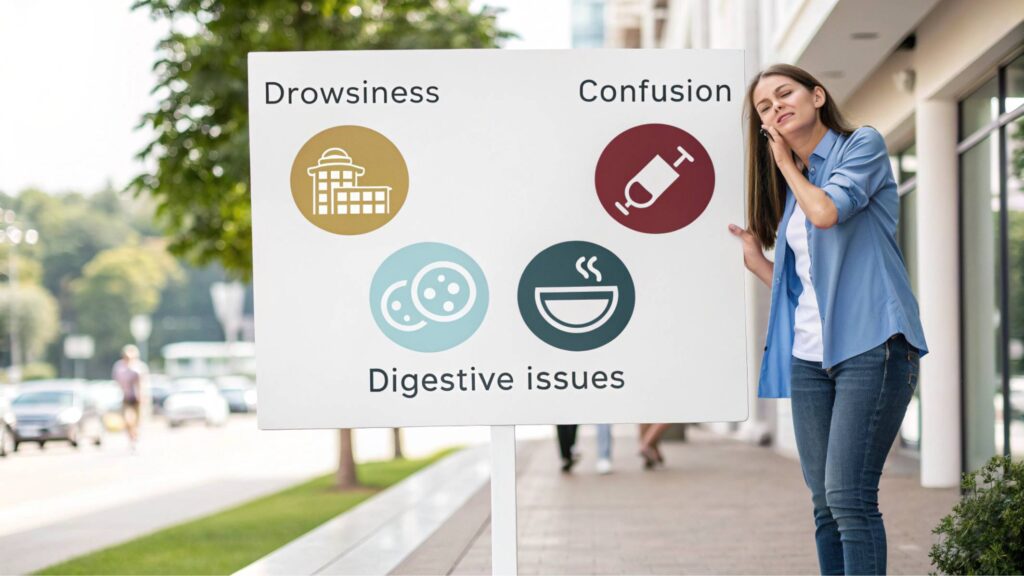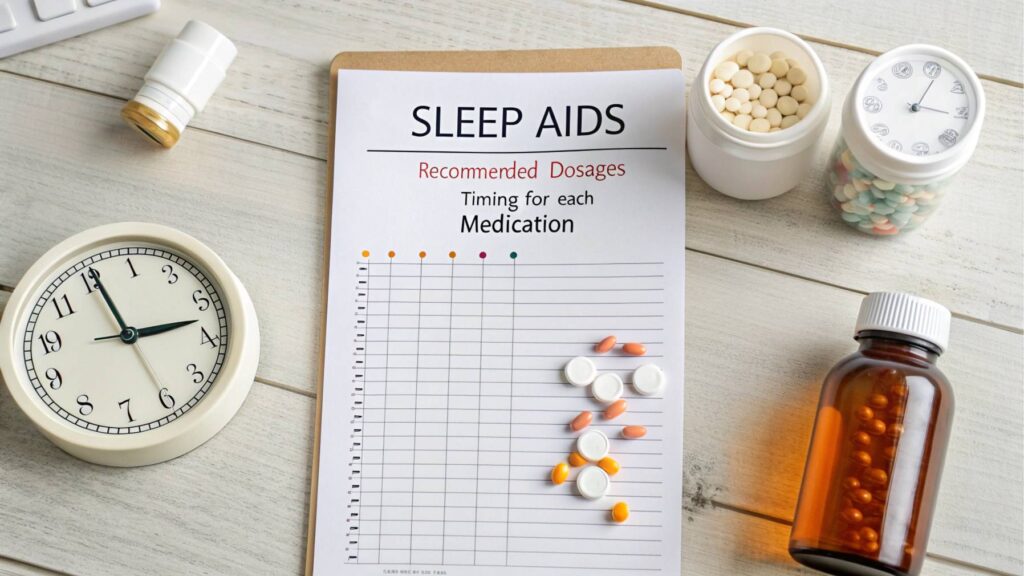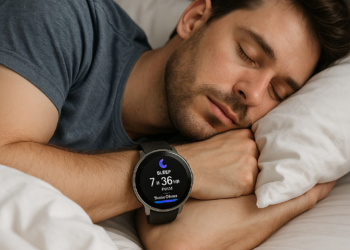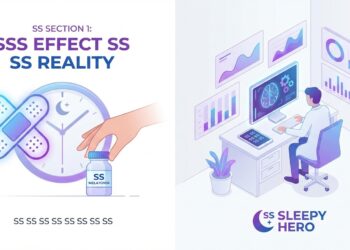Struggling to drift into a peaceful night’s sleep? You’re not alone. In our fast-paced world, insomnia and sleeplessness have become common companions for many. Whether it’s the stress of daily life, irregular schedules, or underlying health issues, finding the right sleep aid can be a game-changer. Dive into our comprehensive guide to explore natural alternatives, over-the-counter options, and prescription medications that can help you reclaim your nights and wake up refreshed.
Key Takeaways
- Types of Sleep Aids: Understand the differences between natural supplements, OTC medications, and prescription drugs.
- Effects and Mechanisms: Learn how various sleep aids work by targeting specific receptors in the brain to promote relaxation and drowsiness.
- Dosage and Usage: Discover recommended dosages and optimal timing for taking sleep aids to maximize effectiveness.
- Potential Side Effects: Be aware of common and severe side effects, including cognitive impairments and digestive issues.
- Interactions and Precautions: Recognize the importance of consulting healthcare professionals to avoid dangerous drug interactions.
- Benefits vs. Risks: Weigh the advantages of improved sleep quality against the risks of dependence and rebound insomnia.
- Alternatives and Professional Help: Explore non-medication options and understand when to seek medical advice for persistent sleep problems.
Understanding Sleeping Pills
Definition of Sleeping Pills
Let’s dive into the world of sleeping pills. What exactly are sleeping pills? In simple terms, sleeping pills are medications that help individuals struggling with insomnia or other sleep disorders achieve a better night’s rest. These medications work primarily on the brain to promote feelings of drowsiness and relaxation. Imagine a peaceful evening after a long day, when all you want is to ease into a restful night’s sleep. That’s where these pills come into play. The underlying mechanism of most sleeping pills involves altering brain chemistry to facilitate sleep. While some pills are specifically designed to induce sleep, others may serve the purpose as side effects of medications intended for different issues. It’s essential to note that the use of sleeping pills should be discussed with a healthcare professional, as they can help discern the best approach tailored to your needs.

Common Types of Sleeping Pills
Sleeping pills come in various forms, each with its unique characteristics and benefits. Breaking them down into categories will help you understand their functions better.1. Over-the-Counter (OTC) Sleep Aids:These medications are readily available at pharmacies and typically contain antihistamines, such as diphenhydramine.
- Advantages:
- Easy access without a prescription
- Effective for mild, occasional insomnia
- Often less expensive
- Common Types:
- Diphenhydramine: Commonly found in products like Benadryl PM. It’s effective for short-term use but might cause morning grogginess.
2. Prescription Sleeping Pills:These are stronger than OTC options and often require a healthcare provider’s approval for use.
“Prescription sleep aids should be seen as part of a broader treatment plan, addressing both symptoms and underlying causes.” – Dr. Robert Lang, Psychiatrist
- Types Include:
- Benzodiazepines: A traditional option but often associated with dependency. Less frequently prescribed now due to the development of newer medications.
- Z-drugs: Such as zolpidem (Ambien) or eszopiclone (Lunesta), they interact with specific brain receptors to promote sleep while minimizing the risk of side effects.
- Ramelteon: A relatively new medication that targets the body’s circadian rhythm, promoting a more natural sleep cycle. It is noted to have minimal side effects.
3. Natural Sleep Aids:Many people look for more gentle alternatives to pharmaceuticals.
- Popular Options:
- Melatonin: A hormone that regulates sleep-wake cycles, often used by those dealing with jet lag or shift work.
- Valerian Root: An herbal remedy said to have calming effects.
“Melatonin supplements can be a gentle nudge for your body’s internal clock, promoting a natural and restful sleep.” – Dr. Emily Thompson, Sleep Specialist
Here’s a quick comparison to clarify:
| Type | Examples | Prescription Needed | Dependence Risk | Common Side Effects |
|---|---|---|---|---|
| OTC Sleep Aids | Diphenhydramine, Doxylamine | No | Low | Drowsiness, Dry mouth |
| Prescription Meds | Benzodiazepines, Z-drugs, Ramelteon | Yes | Moderate to High | Confusion, Amnesia, Dizziness |
| Natural Sleep Aids | Melatonin, Valerian | No | Very Low | Less severe but may include Drowsiness |
While sleeping pills can be a part of the sleep solution for many, they are not a one-size-fits-all approach. As you embark on your journey toward better sleep, it’s vital to consider the unique characteristics and potential side effects of different types of sleeping pills. As someone with friends who’ve struggled with insomnia, I’ve seen firsthand the impact these medications can make. One friend tried an OTC sleep aid with diphenhydramine, and while it helped her fall asleep faster, she found herself feeling like a zombie the next morning. It’s a stark reminder that while sleeping pills can assist in achieving restful sleep, they may not always lead to a refreshed start to the day. Understanding the various types of sleeping pills and their potential impacts allows you to approach your sleep challenges with more confidence. Make sure to keep the conversation open with health professionals to find a solution that works for you. In the next section, we will explore how sleeping pills work and the potential side effects to keep in mind.[1][2]
Effects of Sleeping Pills
How Sleeping Pills Work
Have you ever wondered how sleeping pills actually help you drift off to sleep? It all boils down to specific medications targeting various receptors in your brain. Most sleeping pills work by centering their effects on promoting drowsiness and relaxation, thereby making it easier for you to fall asleep.Essentially, there are three main classes of sleeping pills, each functioning in unique ways:
- Antihistamines: Commonly found in over-the-counter sleep aids, these medications, such as diphenhydramine, block histamines in your body. Histamines are responsible for maintaining your alertness. By blocking them, these pills can induce drowsiness, helping you fall asleep.
- Benzodiazepines: These prescription medications, like temazepam and lorazepam, activate GABA (gamma-aminobutyric acid) receptors in the brain. GABA is a neurotransmitter that promotes relaxation and reduces anxiety, making it an effective choice for sleep.
- Z-Drugs: Medications like zolpidem (Ambien) and eszopiclone (Lunesta) focus more specifically on certain GABA receptors. They are designed to provide quicker effects, a shorter recovery time, and generally fewer side effects than benzodiazepines. However, they still carry risks if misused.
- Natural Sleep Aids: While not as potent as pharmaceuticals, options like melatonin and valerian root can influence the body’s sleep-wake cycles and promote relaxation. Melatonin, in particular, regulates your circadian rhythms and can be a helpful ally in promoting better sleep quality.
For someone like me who has relied on sleeping pills during stressful times, understanding how they operate is essential. A few years ago, I had a particularly hectic work period leading to sleepless nights. I initially tried over-the-counter sleep aids but then realized that prescription options provided better results for my persistent insomnia. But now that I know how they work, I’m more mindful of their proper use!

Potential Side Effects
As beneficial as sleeping pills can be, they aren’t free of potential side effects. Individuals taking these medications should be aware of some common reactions that can occur, especially when starting a new regimen. Here are some side effects you might encounter:
- Hangover Effect: Many people experience grogginess or drowsiness the next day, which can hinder daily activities.
- Digestive Issues: This can include constipation, diarrhea, gas, heartburn, or nausea. Unpleasant for anyone looking to find restful sleep!
- Cognitive Impairments: Sleep medications may lead to confusion or forgetfulness, particularly in older adults. Given that many of us take these medications to relax, feeling foggy or unable to concentrate the next day can be frustrating.
- Parasomnia: Some individuals might engage in abnormal behavior during sleep, such as walking, eating, or even driving without conscious awareness, raising safety concerns.
- Increased Snoring or Sleep Apnea: Sleeping pills may exacerbate existing conditions like sleep apnea, making it crucial to discuss your health history with your healthcare provider before starting any sleep aids.
Here’s a quick table summarizing the potential side effects of sleeping pills:
| Potential Side Effects | Description |
|---|---|
| Hangover Effect | Grogginess or drowsiness the following day. |
| Digestive Issues | Includes constipation, diarrhea, gas, etc. |
| Cognitive Impairments | Confusion, forgetfulness, or poor focus. |
| Parasomnia | Abnormal behaviors during sleep. |
| Increased Snoring/Sleep Apnea | Possible worsening of sleep apnea symptoms. |
While my experience with sleeping pills has been generally positive, I always keep an eye out for any unusual side effects. Managing sleep aids is a balancing act. It’s essential to both enjoy the benefits they offer and remain cautious about their risks.As we conclude this section, it’s clear that sleeping pills can play a significant role in improving sleep, but they come with their own set of considerations. In the next part, we’ll explore the benefits and risks associated with using these medications, providing insight into whether they are a suitable solution for your sleep challenges.[3][4]

Benefits and Risks
Benefits of Using Sleeping Pills
When it comes to tackling insomnia, sleeping pills can offer several significant benefits. For many individuals, a simple tablet can mean the difference between restful sleep and countless sleepless nights. Let’s delve into some of these benefits and see how they might apply to your situation.
- Promotes Drowsiness and Relaxation: Sleeping pills help to induce feelings of drowsiness, allowing people who struggle to fall asleep a better chance at restful slumber. This effect is particularly beneficial during stressful periods or after a long day.
- Improved Sleep Quality: Many users report a marked improvement in the overall quality of their sleep. With regular use (and proper medical advice), sleep aids can help people achieve deeper sleep, reducing the likelihood of waking up during the night.
- Quick Relief for Short-Term Insomnia: When faced with transient insomnia—perhaps due to travel, stress, or a life change—sleeping pills can provide quick relief, easing the transition back to better sleep patterns.
- Support During Other Health Issues: For individuals managing chronic conditions (such as anxiety or pain), sleep aids can be an adjunct therapy, helping mitigate sleep disturbances related to their primary health issues.
- Non-Medication Alternatives: For those who don’t find relief with lifestyle adjustments alone, sleeping pills provide a viable option that may enhance quality of life.
I personally recall a friend who was going through a rough patch at work. After struggling to get enough sleep, she decided to consult her doctor about sleeping pills. Within days, she noticed a significant difference—not only did she sleep more soundly, but her productivity during the day improved drastically, making the pills an excellent short-term solution for her.
Risks Associated with Sleeping Pills
While the benefits can be enticing, it’s crucial to remain aware of the risks associated with sleeping pills. Like any medication, they come with potential downsides that warrant careful consideration. Here are some common risks:
- Dependence and Tolerance: With prolonged use, users can develop a tolerance, leading to the need for higher doses to achieve the same effect. This can spiral into dependence, where you feel unable to sleep without the medication. Psychological dependence is typically more common than physical dependence, meaning users may feel anxious without their sleeping pills.
- Rebound Insomnia: When users decide to stop taking sleep aids, it can lead to rebound insomnia, where sleep disturbances return even more pronounced than before. This can be disheartening and make it difficult to find a natural sleep pattern again.
- Side Effects: Possible side effects of sleeping pills can vary widely but may include drowsiness or confusion the following day, digestive issues (like constipation or diarrhea), headaches, and muscle weakness. For some, these side effects can markedly affect daily life, making it difficult to complete tasks or maintain focus.
- Disruptive Sleep Behaviors: Some medications, particularly Z-drugs, have been associated with parasomnia activities such as sleepwalking, eating, or driving while not fully awake. The potential for these behaviors can raise safety concerns, especially if you live alone or operate heavy machinery.
- Worsened Health Conditions: In some cases, sleeping pills can exacerbate existing health problems like snoring or sleep apnea. This can pose additional health risks, particularly for older adults or those with comorbidities.
Here’s a comparison of the benefits versus the risks of using sleeping pills:
| Benefits | Risks |
|---|---|
| Promotes drowsiness and relaxation | Risk of dependence and tolerance |
| Improved quality of sleep | Possibility of rebound insomnia |
| Quick relief for short-term insomnia | Side effects (drowsiness, confusion) |
| Support for chronic health issues | Disruptive sleep behaviors (parasomnia) |
| Non-medication alternatives available | Worsening of existing health problems |
While my journey with sleeping pills has had ups and downs, I’ve learned that these medications are best utilized as a part of a larger strategy that includes healthy sleep habits. Therefore, navigating the balance between benefits and risks is critical, and decisions should ideally involve consultation with healthcare professionals.In the next section, we will explore some alternatives to sleeping pills, looking at lifestyle changes and non-medication sleep aids that could help promote better sleep without medication.[5][6]
Alternatives to Sleeping Pills
Non-Medication Sleep Aids
If you find yourself struggling with sleeplessness, you’re certainly not alone. While sleeping pills can offer temporary relief, exploring alternatives can lead to better long-term solutions. Many individuals are turning to non-medication sleep aids as a preferred way to ease into slumber. These options often carry fewer risks and side effects compared to pharmaceuticals.
- Melatonin Supplements: Melatonin is a hormone that regulates your sleep-wake cycle. Increasing melatonin levels in your body can help indicate to your brain that it’s time to rest. Research suggests that melatonin can be particularly effective for managing jet lag or adjusting to shift work schedules. However, it is still advisable to use low doses (1-3 mg) to minimize next-day grogginess.
- Herbal Remedies: Several natural herbs have soothing properties that can promote relaxation:
- Valerian Root: This herb has been used for centuries as a sleep aid and may help improve sleep quality. Side effects are generally mild but include headaches and stomach cramps.
- Chamomile: Often enjoyed as a tea, chamomile has gentle sedative properties, perfect for unwinding before bed.
- Lavender: Known for its calming scent, lavender can enhance sleep quality when used as an essential oil or in sachets.
- Aromatherapy: Incorporating essential oils like lavender, cedarwood, or chamomile into your bedtime routine can help create a peaceful environment conducive to sleep. Just a few drops in a diffuser or your pillow can work wonders.
- Mindfulness and Relaxation Techniques:
- Progressive Muscle Relaxation: This technique involves tensing and then relaxing each muscle group in your body, promoting overall relaxation before bed.
- Guided Meditation: Using apps or recordings for guided meditation can help quiet your mind and shift your focus away from the day’s stresses.
When I was navigating a particularly stressful period at work, I found solace in using lavender essential oil. Just a few drops on my pillow significantly improved my quality of sleep, allowing me to feel more rested and ready for the next day.
Lifestyle Changes for Better Sleep
In addition to embracing non-medication sleep aids, making lifestyle changes can significantly enhance your sleep quality. Consider adopting the following strategies:
- Establish a Consistent Sleep Schedule: Go to bed and wake up at the same time every day, even on weekends. This consistency helps regulate your internal clock, making it easier to fall asleep and wake up refreshed.
- Create a Restful Sleep Environment:
- Cool Down: Aim for a cooler room temperature (between 60-67°F is optimal) to foster better sleep.
- Darken Your Space: Use blackout curtains or a sleep mask to block out light. Even small amounts of light can disrupt melatonin production.
- Reduce Noise: If possible, keep your bedroom quiet. Use a white noise machine or earplugs to drown out disruptive sounds and help you stay asleep.
- Limit Screen Time Before Bed: The blue light emitted by screens can interfere with melatonin production and push your sleep-wake cycle off course. Aim to avoid screens for at least an hour before bedtime or consider using blue light blocking glasses in the evening.
- Mind Your Diet:
- Avoid Heavy Meals and Caffeine: Heavy meals, caffeine, and alcohol can disrupt sleep. Try to finish eating at least two to three hours before your bedtime.
- Stay Hydrated but Not Overloaded: While staying hydrated is essential, excessive liquids close to bedtime can lead to frequent trips to the bathroom during the night.
- Exercise Regularly: Engaging in regular physical activity can promote better sleep, helping to reduce anxiety and stress levels. The best timing for exercise is during the day or early evening, as exercising too close to bedtime can be counterproductive.
Here’s a summary of the recommended lifestyle changes to improve sleep:
| Lifestyle Change | Purpose |
|---|---|
| Consistent Sleep Schedule | Regulates the internal clock |
| Create a Restful Environment | Enhances sleep quality |
| Limit Screen Time | Prevents interference with sleep hormone |
| Mind Diet | Avoids disturbances during the night |
| Regular Exercise | Reduces anxiety and promotes rest |
By integrating non-medication sleep aids and adopting healthier lifestyle changes, you can take significant strides toward achieving better sleep without relying solely on pills. As someone who has experienced the benefits firsthand, I strongly encourage you to explore these options and find what works best for you. In the next segment, we will delve into safety precautions and considerations when using any kind of sleep aids, whether medication or natural remedies.[7][8]
Safety Precautions and Considerations
Dosage and Usage Guidelines
When you’re struggling to sleep, it’s tempting to reach for a sleeping pill with the hope of immediate relief. However, using sleeping medications safely is essential to avoid unwanted side effects and ensure effectiveness. Here are some dosage and usage guidelines to follow:
- Talk to Your Doctor: Before starting any sleep aid, whether over-the-counter or prescription, consult your healthcare provider. They can help determine the underlying cause of your sleep issues and ensure that the medication you choose is appropriate for you.
- Follow Recommended Dosages: Always adhere strictly to the dosage prescribed or recommended on the medication label. Increasing the dosage without guidance can lead to dependence and increased side effects. For example, many prescription sleep aids are initially prescribed at lower doses to gauge how your body responds.
- Timing Is Key: For optimal effectiveness, take your sleep medication approximately 20-30 minutes before bedtime. This allows enough time for the medication to begin working. It’s best to plan for a full night’s sleep (ideally 7-8 hours) to prevent daytime grogginess. I vividly remember a time when I took an OTC sleep aid with the intention of waking up early for a flight but ended up groggy and irritable due to insufficient sleep hours.
- Limit Usage to Short-Term: Sleep aids should be used sparingly, ideally for short-term sleep issues caused by stress or life changes. Continuous use can lead to tolerance, requiring higher doses for the same effect, which can escalate the risk of dependence.
- Avoid Doubling Up: If one dose doesn’t seem to work, resist the urge to take another dose in the middle of the night. This can compound the sedative effects and leave you feeling excessively drowsy the next day.

Consider this simple table for visual reference on dosages and usages:
| Medication Type | Recommended Dosage | Best Timing |
|---|---|---|
| Over-the-Counter (e.g., Diphenhydramine) | Follow package instructions (usually 25-50 mg) | 20-30 minutes before bed |
| Prescription Sleep Aids (e.g., Zolpidem) | Start with the prescribed dosage, often 5-10 mg | 20-30 minutes before bed |
| Melatonin | 1-3 mg is a common starting dose | 30 minutes before bed |
By keeping these guidelines in mind, you can use sleep medications more safely and effectively.
Interactions with Other Medications
Understanding how sleep aids can interact with other medications is a critical aspect of safe usage. Many people don’t realize that combining certain drugs, including common over-the-counter medications, can lead to serious side effects or reduced effectiveness.
- Alcohol and Sedatives: One of the most dangerous combinations is alcohol and sleep medications. Alcohol can amplify the sedative effects of sleep aids, putting you at risk of extreme drowsiness, confusion, or even dangerous sleep-related behaviors like sleep-driving. The increase in sedation can cloud your judgment and impair motor skills. My friend once mixed melatonin with a glass of wine, resulting in a wild and unsafe sleepwalking episode that left her confused and concerned when she woke up.
- CNS Depressants: Other medications that depress the central nervous system (CNS), such as certain antidepressants, muscle relaxants, or opioids, can heighten the sedation from sleeping pills. Always inform your healthcare provider about any medications you are taking to avoid dangerous interactions.
- Herbal Supplements: Just because an aid is “natural” doesn’t mean it is harmless. For instance, valerian root can interact with other sedatives, and melatonin may affect blood pressure medications. Be sure you discuss any herbal supplements with your doctor.
- Timing with Other Medications: Some sleep medications, especially benzodiazepines, should not be taken within hours of certain other drugs due to interaction risks. It’s crucial to read labels and consult a healthcare professional about potential timing issues with your current medications.
- Medical Conditions: Additionally, inform your doctor about any existing medical conditions, as certain medications can have adverse effects. For example, sleep medications can exacerbate conditions like sleep apnea, severe depression, or liver issues.
Here is a summary of interaction considerations:
| Interaction Type | Effects | Precautions |
|---|---|---|
| Alcohol + Sleep Aids | Increased sedation; confusion; impaired motor skills | Avoid all alcohol while using sleep aids |
| CNS Depressants | Enhanced sedative effects; dangerous behaviors | Discuss all medications with your doctor |
| Herbal Supplements | Potential interactions with sedative effects | Reveal all supplements to your healthcare provider |
| Pre-existing Medical Conditions | Exacerbated symptoms or side effects | Consult a healthcare professional before use |
Being proactive about potential interactions with sleep aids and ensuring proper usage will set you on a path to better, safer sleep solutions. Following these precautions not only helps improve your sleep experience but also protects you from unwanted complications.Next, we will explore when it is essential to seek professional help for sleep disorders and the importance of ongoing medical supervision.[9][10]

Seeking Professional Help
When to Consult a Doctor
Navigating sleep challenges can be frustrating, especially when tossing and turning becomes a nightly ritual. While occasional sleepless nights are often manageable with lifestyle changes or occasional sleep aids, there are clear signs that indicate when it’s time to consult a healthcare professional. Here’s a rundown of the situations where seeking medical advice becomes essential:
- Persistent Insomnia: If you’ve been struggling to fall asleep or stay asleep for more than a few weeks, it’s time to reach out to your doctor. Chronic insomnia can affect your mental and physical health and often has underlying causes that might need to be addressed.
- Accompanying Symptoms: Experiencing symptoms such as daytime fatigue, mood swings, anxiety, or irritability can signal that your sleep problems may not simply be due to stress or a busy schedule. These symptoms could point to a more serious sleep disorder or mental health concern.
- Use of Sleep Aids: If you find yourself increasingly relying on over-the-counter or prescription sleep medications, it’s crucial to speak with a doctor. Long-term reliance on sleep aids can lead to dependence and may mask underlying issues that might be treatable.
- Medical Conditions: If you have existing medical conditions such as anxiety, depression, chronic pain, or respiratory issues like sleep apnea, consulting a doctor can help manage sleep disturbances related to these problems effectively.
- Complex Sleep-Related Behaviors: If you or a loved one notices sleepwalking, sleep-eating, or other unusual behaviors while asleep, it’s important to talk to a healthcare provider. These signs can indicate the need for further evaluation and intervention.
In my own experience, I faced sleepless nights during a particularly stressful season at work. Recognizing the impact this had on my mood and daily productivity, I consulted my doctor, who helped identify underlying anxiety contributing to my insomnia, leading to a more holistic approach to my sleep challenges.
Importance of Medical Supervision
The journey to better sleep can often be complex, and having a healthcare professional on your side can make a significant difference. Here’s why medical supervision is essential when dealing with sleep issues:
- Personalized Assessment: A doctor can conduct a comprehensive assessment to determine the underlying causes of your sleep troubles. This may include evaluating your medical history, lifestyle factors, and any medications you’re currently taking.
- Safe Medication Management: If sleep aids are deemed appropriate, a medical professional can prescribe the right type and dosage tailored specifically to your needs. They can also monitor your response to medication, addressing any side effects or adjustments necessary for safety and effectiveness.
- Integrated Treatment Plans: Beyond just prescribing sleeping pills, healthcare professionals can guide you toward additional treatments such as cognitive-behavioral therapy (CBT) for insomnia. This approach can be highly effective, providing strategies and skills to manage thoughts and behaviors contributing to sleep difficulties.
- Ongoing Support and Follow-Up: Regular check-ins with your doctor can help you track your progress and adapt treatment plans as necessary. Ongoing support fosters accountability and can aid in adjusting strategies to achieve better sleep outcomes.
- Awareness of Comorbid Conditions: Many sleep disorders such as sleep apnea, restless leg syndrome, or period limb movement disorder often go undiagnosed. A medical professional can provide the necessary evaluation and necessary referrals for specialized care if needed.
Here’s a quick summary of when to consult a doctor and the significance of their guidance:
| When to Consult a Doctor | Importance of Supervision |
|---|---|
| Persistent insomnia | Personalized assessment for a tailored approach |
| Accompanying symptoms | Safe medication management and monitoring |
| Increased use of sleep aids | Integrated treatment plans including behavioral therapy |
| Existing medical conditions | Ongoing support and follow-up for better outcomes |
| Unusual sleep-related behaviors | Awareness and assessment of potential sleep disorders |
Seeking professional help is a wise step toward reclaiming restful nights and enhancing overall well-being. Your struggles with sleep deserve serious attention, and working alongside healthcare experts can make the journey manageable and lead to effective solutions. With proper guidance, you can overcome sleep challenges and enjoy improved quality of life. In the next section, we will summarize key takeaways and reflect on the journey toward better sleep.[11][12]
Wrap up
As we wrap up this exploration of sleep aids and their various facets, it’s essential to reflect on the most important points that can help you navigate your sleep challenges more effectively. Here’s a summary that can serve as a guide:
- Understanding Sleeping Pills:
- Sleeping pills, both over-the-counter and prescription, work primarily by targeting GABA receptors in the brain to promote drowsiness and relaxation.
- They can provide significant relief for those suffering from insomnia, but they also come with potential side effects and risks.
- Types of Sleep Aids:
- Various sleep medications exist, including antihistamines, selective GABA medications, and natural supplements like melatonin and valerian root.
- Each type of sleep aid has its mechanism of action and different side effect profiles. Individual responses may vary.
- Benefits vs. Risks:
- While sleep aids can relieve temporary sleeplessness, they are not a long-term solution.
- Careful usage is essential to minimize risks such as dependence, rebound insomnia, and adverse reactions, notably when combined with alcohol or other CNS depressants.
- Safety Precautions:
- Following proper dosage, timing medications, and consulting with healthcare professionals is crucial in managing your sleep health.
- Be aware of interactions with other medications and existing health conditions that may affect safe usage.
- Seeking Professional Help:
- Consult with your doctor when persistent insomnia disrupts your life or if you experience concerning symptoms.
- Your healthcare provider can help to identify underlying issues, as well as recommend lifestyle changes and therapies that might be more effective in the long term, like cognitive-behavioral therapy (CBT).
In my case, I learned the hard way that relying solely on sleep aids without understanding their effects and safely managing their use could lead to unwanted side effects—like an increased feeling of fatigue during the day. It wasn’t until I sought a professional’s advice that I could establish a balanced approach to my sleep health.
Main Tips
- Consult a Healthcare Professional: Always seek medical advice before starting any sleep aid, especially if you have underlying health conditions.
- Follow Dosage Instructions: Adhere to recommended dosages to minimize the risk of side effects and dependence.
- Limit Use to Short-Term: Use sleep aids sparingly for short-term issues rather than as a long-term solution.
- Avoid Alcohol: Refrain from consuming alcohol while taking sleep medications to prevent dangerous interactions.
- Explore Alternatives: Incorporate non-medication strategies like cognitive-behavioral therapy and relaxation techniques for sustainable sleep improvement.
Final Thoughts
Achieving better sleep is a journey that requires a multifaceted approach, combining the understanding of medications, lifestyle modifications, and the importance of seeking professional guidance. It’s easy to feel overwhelmed, especially when life gets busy, and insomnia creeps in, but remember that positive changes can lead to significant improvements.
- Prioritize Sleep Hygiene: Adopting good sleep habits can be as effective as medication for many people. Establishing a consistent sleep schedule, creating a restful environment, and practicing relaxation techniques can bring about a more restorative sleep experience.
- Be Patient: Changes won’t happen overnight. It may take time to find the right combination of approaches that work for you, so be patient with yourself.
- Consider Holistic Approaches: Alongside sleep medications, explore non-medication alternatives such as herbal remedies or mindfulness practices. The integration of these into your routine can enhance the quality of your sleep without the side effects associated with pharmaceuticals.
Ultimately, every individual’s situation is unique, and what works for one person might not work for another. Engaging with healthcare professionals, conducting diligent research, and being proactive about your sleep health can lead you to find the solutions that better meet your needs. Remember, a good night’s sleep is foundational to your overall well-being, influencing everything from your emotional state to your productivity and physical health. Whether you choose medication, lifestyle changes or a combination of both, the goal remains the same: achieving restful and rejuvenating sleep that allows you to face each day with energy. Embrace the journey to better sleep health, and take proactive steps toward enhancing your overall quality of life![13][14]
Conclusion
Embracing a solution for sleeplessness is a journey that requires informed choices and mindful practices. From natural supplements like melatonin and valerian root to over-the-counter options such as diphenhydramine, and prescription medications like benzodiazepines and Z-drugs, each sleep aid offers unique benefits and potential risks. It’s crucial to assess your specific needs, consider the possible side effects, and consult healthcare professionals to tailor a sleep strategy that aligns with your health profile. Additionally, integrating non-medication alternatives like cognitive-behavioral therapy and lifestyle adjustments can enhance your sleep quality sustainably. Remember, while sleep aids can provide immediate relief, fostering healthy sleep habits will contribute to long-term well-being. Prioritize open conversations with your healthcare provider to navigate sleep challenges confidently and safely.
FAQs
1. What are the most effective natural sleep aids?
Natural sleep aids like melatonin and valerian root are popular for their ability to regulate sleep cycles and promote relaxation without the side effects associated with pharmaceuticals.
2. Can over-the-counter sleep aids lead to dependence?
Yes, while OTC sleep aids like diphenhydramine are generally safe for short-term use, prolonged use can lead to tolerance and dependence. It’s essential to follow dosage recommendations and consult a healthcare provider for long-term sleep issues.
3. What should I consider before taking prescription sleep medications?
Before starting prescription sleep medications, consider potential side effects, interactions with other drugs, and underlying health conditions. Always consult with a healthcare professional to determine the best and safest option for your specific needs.
4. How do sleep aids interact with alcohol?
Combining sleep aids with alcohol can amplify sedative effects, leading to excessive drowsiness, confusion, impaired motor skills, and increased risk of dangerous behaviors like sleep-driving. It is strongly advised to avoid alcohol while using sleep medications.
5. When should I seek professional help for sleep problems?
If you experience persistent insomnia for more than a few weeks, daytime fatigue, mood swings, or rely heavily on sleep aids, it’s time to consult a healthcare professional to address underlying causes and develop a comprehensive treatment plan.
Resources
- National Sleep Foundation
- Mayo Clinic on Insomnia
- Harvard Health: Understanding Sleep
- Cleveland Clinic: Insomnia Treatments
Recommended Products
- Natrol Melatonin 5mg Tablets
Support your sleep cycle naturally with Natrol’s melatonin supplements, designed to promote restful nights.
Shop on Amazon - Nature’s Bounty Valerian Root Capsules
Experience the calming effects of valerian root with Nature’s Bounty, perfect for easing into sleep.
Shop on Amazon - ZzzQuil Pure Zzzs Melatonin Gummies
Delicious gummies that help you relax and unwind, making bedtime a breeze.
Shop on Amazon - Temazepam Extended-Release Tablets
For those requiring prescription sleep aids, Temazepam offers extended relief from insomnia.
Shop on Amazon - Philips Wake-Up Light Alarm Clock
Enhance your sleep routine with a wake-up light that simulates sunrise, promoting natural waking.
Shop on Amazon








